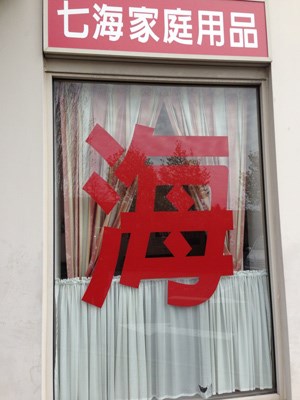It makes no business sense to spend money, time and energy attracting customers who wouldn't be interested in your core product.
So why would Seahorse Household Products - on the very tip of Union Square, in the heart of the Golden Village - devote more than its five per cent of frontage to the English word? After all, its top seller, the Seahorse Mattress, is very firm and is popular almost exclusively to people of Asian descent, according to the shop's manager.
To the average English-speaking Richmondite, you wouldn't know from the outside if Seahorse sold mattresses or live seafood.
"You prefer a soft bed, yes?" Cathy Mak, Seahorse's manager, asked the News' Caucasian, English-speaking reporter.
When told the answer was, "yes," Mak went on to say the Hong Kong-based company's customer base is 95 per cent Asian.
But would more English on Mak's signs and advertising encourage more English-speaking customers to frequent the business?
"No, our main product is firm mattresses, which are mainly sought by Chinese people," said Mak.
"Not many Caucasian people like these, they prefer soft mattresses. So there is little need for English."
However, further south-east in The Village, at Pacific Plaza, the services provided by John Wong, of A & A Wong's Insurance, are more easily transferable across the cultural divide.
Wong currently has about half and half Chinese and English language on the front of his Odlin Crescent office.
But it's not that Wong, whose family immigrated from mainland China in 1958, hasn't had to put his back into it.
He recognized early on the advantages of being bilingual and, as such, employed bilingual staff to be able to deal with both ethnicities when they walked through his door.
"My customer base is about 50/50 Chinese and English-speaking," said Wong.
"People can be comfortable in either language when they come in here. And there are also lots of second generation Chinese who can speak Chinese but can't read it, so they need the English signs as well."
Coming from mainland China, though, Wong said he fully understands why some businesses advertise their wares in only or predominantly Chinese.
"They are very restricted to the Chinese market because they don't want to make a mistake or offend anyone when they can't communicate with them in English," explained Wong.
"Signs are a form of advertising and it's about targeting the customer you want. They target the Chinese-speaking customer because that's what they're comfortable with.
"And any contact they need to have beyond their Chinese-speaking customer can be done speaking Chinese, because their suppliers speak Chinese or they have bilingual accountants and lawyers who can do their business with city hall for them."
Mark Lai, Pacific Plaza's manager, said the vast majority of the business owners in the mall are Chinese, but none advertise solely in the Chinese language.
"We don't have a policy on the signage," added Lai.
While Billy Chui, who has run the Contemporary Beauty Studio for 15 years, has signage in both languages - despite the fact it draws in very few English-speaking customers.
"I had hoped it might improve the traffic flow," said Chui of his bilingual signage.
"But it hasn't. But I do it because this is Canada and English is the traditional language, so I like to have it there."
Coun. Chak Au, who tried and failed to have city hall examine the issue of language on signage, said the plethora of businesses across the entire Golden Village that have both languages illustrates a rarely reported respect for the English language.
"Many of those businesses have few English-speaking customers, yet they still (use English)," added Au.
"They respect the non-Chinese community and the official language of Canada and we need more of that.
"These business owners are immigrants who have been here for longer. This might demonstrate that new immigrants will learn to adjust to the larger social environment over time."



